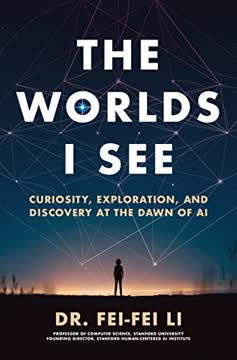Key Takeaways
1. Generative AI: A Transformative Force in Business
"Generative AI will change the nature of how we interact with all software."
Personalized interactions. Generative AI is poised to revolutionize how businesses interact with customers by enabling highly personalized and efficient interactions. This technology can create text, speech, images, music, video, and code, allowing for tailored experiences that go beyond traditional software interfaces.
Expanded capabilities. Companies will need to rethink their offerings and develop underlying data and tech architectures to connect everything involved in customer solutions. This shift will lead to broader journey expansions and new partner relationships, potentially opening up new revenue sources beyond current boundaries.
Challenges to address. While the potential benefits are significant, businesses must also consider:
- Data integration and management
- Rule layers to ensure appropriate AI responses
- Delivery of end-to-end customer journeys
- Differentiation through ecosystem partnerships
- Prioritization of safety, fairness, privacy, security, and transparency
2. Network Effects Amplify AI's Power and Value
"AI improves through reinforcement learning—predictions followed by feedback."
Data network effects. Unlike traditional network effects, AI's value increases through data network effects. As more users interact with AI systems, they provide more data and feedback, which improves the AI's predictions and suggestions. This creates a virtuous cycle of improvement and increased value.
Implications for businesses. Companies should:
- Prioritize gathering high-quality, relevant data
- Establish feedback loops to continuously improve AI models
- Consider the data they share and its potential value to competitors
- Develop strategies to maintain direct contact with customers and protect valuable data
3. Balancing Risk and Demand in AI Project Selection
"The top-left box—where the consequence of errors is relatively low and market demand is high—will inevitably develop faster and further."
Risk-demand matrix. When selecting AI projects, companies should consider both the potential risks of errors and the market demand for the solution. Projects with low risk and high demand are ideal starting points for AI implementation.
Promising areas:
- Marketing content generation
- Internal corporate learning tools
- Text review and editing assistance
- Idea generation for brainstorming sessions
Cautionary approach. Areas with high risk or low demand should be approached more cautiously, as they may not provide immediate value or could pose significant challenges in implementation.
4. AI's Impact on Creative Work: Opportunities and Challenges
"AI-powered systems are on the way to becoming every salesperson's (and every sales manager's) indispensable digital assistant."
Three potential scenarios:
- AI-assisted innovation explosion
- Machines monopolizing creativity
- Human-made content commanding a premium
Implications for creative industries. Generative AI has the potential to:
- Augment human creativity and productivity
- Democratize access to creative tools
- Disrupt traditional creative processes and job roles
- Raise concerns about copyright and intellectual property
Preparing for change. Creative professionals and businesses should:
- Develop skills in AI collaboration
- Focus on uniquely human creative abilities
- Consider ethical and legal implications of AI-generated content
5. Augmenting Human Creativity with Generative AI
"Generative AI can remove this obstacle."
Enhancing creative processes. Generative AI can support human creativity by:
- Promoting divergent thinking
- Assisting in idea evaluation and refinement
- Facilitating collaboration between designers and users
Practical applications:
- Generating diverse product designs
- Evaluating and combining ideas in innovation contests
- Enabling co-creation between companies and customers
Democratizing innovation. By removing barriers to communication and visualization, generative AI can enable more people to contribute innovative ideas and concepts across various industries.
6. Revolutionizing Sales with AI-Powered Assistants
"AI is already making customer self-service more powerful, and inside sales more potent."
Transforming sales processes. AI-powered systems can help salespeople and managers by:
- Reversing administrative creep
- Enhancing customer interactions
- Assisting sales managers in planning and coaching
Implementation strategies:
- Integrate AI capabilities into existing sales systems
- Start with quick-win applications to realize value rapidly
- Balance automation with human involvement in decision-making
Future of sales roles. While AI will automate many tasks, human salespeople will remain crucial for complex sales situations that require empathy, relationship-building, and navigating intricate buying organizations.
7. Navigating Intellectual Property Concerns in AI
"If a business user is aware that training data might include unlicensed works or that an AI can generate unauthorized derivative works not covered by fair use, a business could be on the hook for willful infringement, which can include damages up to $150,000 for each instance of knowing use."
Legal challenges. The use of generative AI raises several intellectual property concerns, including:
- Copyright infringement in training data
- Ownership of AI-generated content
- Potential for creating unauthorized derivative works
Risk mitigation strategies:
- Ensure proper licensing of training data
- Implement robust documentation and provenance tracking
- Develop clear policies for AI use and content generation
- Stay informed about evolving legal interpretations and precedents
8. Problem Formulation: The Key to Effective AI Use
"Without a well-formulated problem, even the most sophisticated prompts will fall short."
Beyond prompt engineering. While prompt engineering has gained attention, the more critical skill for leveraging AI is problem formulation. This involves:
- Problem diagnosis: Identifying the core issue to be solved
- Problem decomposition: Breaking complex problems into manageable subproblems
- Problem reframing: Changing perspectives to explore alternative solutions
- Problem constraint design: Defining boundaries and restrictions for solution search
Developing problem formulation skills. Organizations should:
- Invest in training employees to effectively analyze and define problems
- Encourage cross-functional collaboration in problem-solving
- Create processes for iterative problem refinement and solution testing
9. Ethical Considerations in AI Development and Deployment
"If not designed and deployed with clear ethical guidelines, generative AI can have unintended consequences and potentially cause real harm."
Key ethical principles:
- Transparency in AI decision-making
- Fairness and bias mitigation
- Privacy protection and data security
- Accountability and responsible use
Implementing ethical AI practices:
- Develop clear guidelines and principles for AI use
- Establish diverse teams for AI development and oversight
- Implement robust testing and monitoring processes
- Engage with stakeholders and impacted communities for feedback
Regulatory landscape. Stay informed about evolving AI regulations and proactively address ethical concerns to build trust and mitigate risks.
10. Managing Risks and Ensuring Responsible AI Integration
"Organizations must recognize the need to ensure the ethical, transparent, and responsible use of these technologies."
Guidelines for responsible AI use:
- Accuracy: Train models on high-quality data and communicate uncertainty
- Safety: Mitigate bias and protect privacy in training data
- Honesty: Respect data provenance and disclose AI-generated content
- Empowerment: Balance automation with human involvement
- Sustainability: Minimize environmental impact of AI systems
Practical implementation strategies:
- Use zero-party or first-party data for training
- Keep data fresh and well-labeled
- Ensure human oversight in critical decisions
- Conduct thorough testing and continuous monitoring
- Seek feedback from employees, advisers, and impacted communities
Building a responsible AI culture. Organizations should integrate ethical considerations into their AI development processes and foster a culture of responsible innovation to maximize the benefits of AI while minimizing potential harm.
Last updated:
FAQ
What's "Generative AI: The Insights You Need from Harvard Business Review" about?
- Overview of Generative AI: The book provides a comprehensive understanding of generative AI, its capabilities, and its potential impact on businesses and society.
- Collection of Insights: It compiles research, interviews, and analyses from Harvard Business Review, offering foundational knowledge and practical case studies.
- Future Preparedness: The book aims to prepare organizations for the transformative effects of generative AI on business operations and customer interactions.
Why should I read "Generative AI: The Insights You Need from Harvard Business Review"?
- Stay Informed: It helps readers stay informed about the fast-evolving field of generative AI and its implications for various industries.
- Practical Applications: The book provides practical insights and case studies that can be directly applied to enhance business strategies.
- Competitive Edge: Understanding generative AI can give businesses a competitive edge by enabling them to innovate and adapt to technological changes.
What are the key takeaways of "Generative AI: The Insights You Need from Harvard Business Review"?
- Transformative Potential: Generative AI has the potential to revolutionize business processes, customer interactions, and creative work.
- Ethical Considerations: The book emphasizes the importance of ethical guidelines and responsible use of AI technologies.
- Strategic Implementation: It provides frameworks and strategies for effectively integrating generative AI into business operations.
How does "Generative AI: The Insights You Need from Harvard Business Review" suggest businesses adapt to generative AI?
- Data Integration: Businesses should focus on integrating data from various sources to enhance AI capabilities.
- Customer-Centric Solutions: Companies need to tailor AI solutions to meet the comprehensive needs of their customers.
- Ethical Practices: Implementing ethical AI practices is crucial to mitigate risks and ensure compliance with regulations.
What are the network effects of AI as discussed in "Generative AI: The Insights You Need from Harvard Business Review"?
- Data Network Effects: AI systems improve with more data, leading to better predictions and increased value.
- Feedback Loops: Continuous feedback from users enhances AI accuracy and effectiveness.
- Strategic Partnerships: Collaborations, like that of OpenAI and Microsoft, leverage network effects to enhance AI capabilities.
How does "Generative AI: The Insights You Need from Harvard Business Review" address the risks of generative AI?
- Intellectual Property Concerns: The book discusses potential IP infringement issues and the need for compliance with existing laws.
- Bias and Fairness: It highlights the importance of addressing biases in AI systems to ensure fair and accurate outcomes.
- Data Privacy: Protecting sensitive data and ensuring privacy are critical considerations for businesses using AI.
What is the role of prompt engineering in generative AI according to "Generative AI: The Insights You Need from Harvard Business Review"?
- Temporary Skill: Prompt engineering is currently important but may become less relevant as AI systems improve.
- Problem Formulation: The book emphasizes the enduring importance of problem formulation over prompt engineering.
- AI Understanding: Future AI systems will likely require less precise prompts as they become more intuitive.
How can businesses use generative AI to enhance creativity, as per "Generative AI: The Insights You Need from Harvard Business Review"?
- Augmenting Human Creativity: Generative AI can support divergent thinking and inspire novel ideas.
- Overcoming Biases: AI can help challenge expertise biases and encourage innovative solutions.
- Collaborative Design: AI facilitates collaboration between designers and users, leading to more personalized and creative outcomes.
What are the ethical guidelines for generative AI development in "Generative AI: The Insights You Need from Harvard Business Review"?
- Accuracy and Safety: Ensuring AI models are trained on accurate data and are safe to use is paramount.
- Transparency and Honesty: AI systems should be transparent about their data sources and outputs.
- Empowerment and Sustainability: AI should empower users and be developed with sustainability in mind.
How does "Generative AI: The Insights You Need from Harvard Business Review" suggest managing the hype around AI?
- Focus on Practical Use: The book advises focusing on practical machine learning applications rather than overhyping AI capabilities.
- Realistic Expectations: It encourages setting realistic expectations for AI projects to avoid disillusionment.
- Value-Driven Approach: Emphasizing the tangible value AI can bring to business operations is crucial.
What are the potential impacts of generative AI on sales, according to "Generative AI: The Insights You Need from Harvard Business Review"?
- Administrative Efficiency: AI can reduce administrative tasks, allowing sales teams to focus on customer interactions.
- Enhanced Customer Insights: AI provides deeper insights into customer preferences and behaviors.
- Sales Strategy Optimization: Generative AI can assist in developing more effective sales strategies and recommendations.
What are the best quotes from "Generative AI: The Insights You Need from Harvard Business Review" and what do they mean?
- "Generative AI will change the way businesses develop customer-focused products, leading to new levels of personalization and customization." This highlights the transformative potential of AI in creating tailored customer experiences.
- "AI is already making customer self-service more powerful, and inside sales more potent." This emphasizes AI's role in enhancing sales processes and customer service.
- "The risks—from the core data, to the management of data, to the nature of the output of the generative AI—will keep multiplying." This warns of the increasing complexity and potential risks associated with AI technologies.
Review Summary
The reviews for Generative AI are mixed. While some readers found it a useful introduction to the topic, others felt it lacked depth and offered little new information. The book is a compilation of articles covering various aspects of generative AI, including its impact on business, creativity, and sales. Critics noted that much of the content is similar to existing online resources and that the takeaways often oversimplify complex ideas. Some readers appreciated specific articles on creative work and problem formulation, but overall, the book received moderate ratings.
Similar Books










Download PDF
Download EPUB
.epub digital book format is ideal for reading ebooks on phones, tablets, and e-readers.














